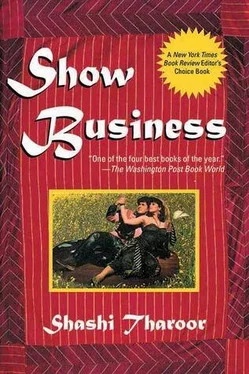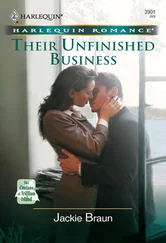A growl is heard. A grrrowl, in fact. Abha screams: “Ashok! The cheetah!” Ashok, his hands at Godambo’s throat, looks back in horror. It is Godambo’s pet, now grown almost to full size. The villain’s wide eyes gleam. “Cheetah, come!” he commands. The animal takes in what is happening and growls menacingly. Then, with a single powerful bound, it leaps toward its master and his attacker.
Ashok steps aside.
“No-o-o-o!” cries Godambo, but it is too late. The animal lands squarely on his chest. Godambo reaches out to try to save himself, then with a last gravelly cry of despair, topples in slow motion into the sea. His confused pet follows him.
The camera lingers lovingly on Godambo’s falling torso, the cape swirling around him like a defective parachute. At last he hits the water, with a satisfying splash. The camera stays long enough on the spot to convince the viewer that he does not come up again. Only then does Ashok turn to Abha, a new light in his eyes.
She runs into his arms. He clasps her in their seventh tight embrace.
They are outside now, where a few lugubrious Black Cheetahs are being energetically herded into police vans.
”Shabash, Ashok,” says Iftikhar. Ashok smiles, hugs Abha, and reaches out an arm to Maya. The sound track swells with the theme song, this time sung by the two women:
You are the long arm of the law,
You always show villains the door.
By day or by night
You handle any fight
And put all the bad men on the floor!
They look like one small happy family, smiling for the camera until the words THE END fill up the screen.
[Note: this is an abbreviated version of the story. For reasons of space and stamina, we have omitted one puja, two tearful scenes before Ashok’s father’s photograph, an entire comic subplot featuring a domestic servant in a Gandhi cap and a fat woman in a nightdress, and four songs.]
Monologue: Night
PRANAY
Your first hit. Godambo. Your first big hit, in only your second film. You always had it easy, Ashok. Just had to open your mouth sufficiently to move the silver spoon to one side, and producers scrambled to say yes. Actresses too.
Who’d have believed it? None of us took your chances very seriously, not even when Jagannath Choubey cast you in that first film, Musafir with Abha. OK, Abha’s was still a name to be reckoned with in the industry, but mainly for those with good memories. She wasn’t the hottest property around by any means, no longer ranking beside the likes of Sharmila Tagore and Raakhee as a crowd-puller, but you could have done worse. I mean, you could have ended up with a fresh graduate from the Film Institute, or one of those desperate starlets who’ve done the unimaginable to get a lead role but who’ll never convince anyone, least of all the audience, that she is heroine material. That would have condemned her and you to permanent eclipse. Which, frankly, was what everyone expected. Especially me.
But it worked, or worked well enough to keep you in business. There was that “I shall always chase you” song, which became a hit even before the movie was released, with every street corner mastaan and Eve-teaser in India singing it to accompany and justify their unwelcome pursuits. The film itself didn’t do as badly as the industry thought it would, so by default it was seen as something of a success. Some of us thought you were pretty wooden, frankly, and your dancing was embarrassing. But it was obvious that the experts had got it wrong. None more so than that harridan Radha Sabnis, the dreaded Cheetah of Showbiz:
Darlings, does the name Ashok Banjara ring a bell with you pussycats? [How would it? She’d called you Anil the last time.] That’s right, he’s the long-legged type with the political connections who came with the tablecloth at Bollywood parties. Can you believe it, darlings, this would-be abhineta with the looks of a second-rate garage mechanic actually made it into the passenger seat! Yes, he has a starring role in Jagannath Choubey’s latest masala movie, Musafir, opposite Daddy’s old favorite, Abha Patel. Rumor has it that the evergreen heroine has had more face-lifts than her hero’s had dance lessons. Not very promising, pussycats! Choubey seems to have a maha flop on his hands. And where will that leave his poor twinkling little stars? Banjara, of course, can always go back to light up the corners of the party circuit, but what will poor dear Abha do? Nothing military about the lady, but she should know that dimming stars are like old soldiers — they just fade away. Grrrowl!
Well, it didn’t work out quite like that, did it? Cheetah didn’t chatter too much about you after that. Musafir didn’t lose money; in fact, I believe it made some. And then Choubey went and cast you with Abha again in Godambo, and the rest, as they say, is history. His story. Your story.
Lucky bastard. Never again will you need to play the hero in a movie named after the villain.
What do you know, Ashok Banjara, of what it’s really like to try and make it as an actor in Hindi films? I’ll tell you, I should know. I grew up in the bloody industry. My father was an assistant to a big-name director, but he never graduated beyond being an assistant director. He had work, but never much money. In school I tried to drop names about the stars we knew, but that never impressed the kids for long when it became obvious that there wasn’t any money to go with the glamour. I was always the kid who didn’t throw a birthday party, because quite simply my parents couldn’t afford to pay for one. Ma made rice kheer for dessert, sometimes Papa bought a cheap toy in the bazaar or took me for a pony ride at the Bandstand, and that was the extent of the celebration. In my entire childhood I never had a birthday cake. But I was growing up in a world where every other kid I came in contact with got to choose the flavor of the cake and had his name written on it with icing. That became my great aspiration: to have a birthday cake one day, with my name on it. It took me a while to fulfill that ambition. The moment I could afford it, on my twenty-fourth birthday, I ordered the hugest, most expensive chocolate cake I could find and had “Happy Birthday Pranay” inscribed on it in letters an inch high. There were glazed-icing flowers and marzipan rosebuds and little silver balls you could bite into. I had everything put on it, everything. And then I took it home and ate it all by myself. I hated it. I was sick for days afterward. But I really felt I had achieved something, that I had arrived.
I grew up in a two-room flat in Matunga, you know, in the unfashionable suburbs. Slept on the floor. That wasn’t so bad; the real problem was the bathroom. We shared one filthy bathroom with eight other families on the same floor. Everyone wanted it first thing in the morning, so you had to keep getting up earlier and earlier in order to beat your neighbors to it; otherwise you were bound to be late for school or work. By the time I did my matric I was getting up at 4:30 just to be able to use the bathroom. I’ll never forget what it was like to grope my way in the dark, stand on that slimy floor, and feel some nameless creature slither across my feet just before I switched on the light. To do that every day, day after day, week after week, with no prospect of anything ever changing. What did you know of that, hanh, Ashok Banjara?
Sometimes, thanks to my father’s work, we would be invited to some star’s house for a special occasion — Diwali, or a wedding or something. That was the biggest event in our lives. I would spend every day looking forward to the visit. It didn’t matter if nobody even noticed my existence there, just stepping into a house like Raj Kapoor’s or Sunil Dutt’s made life worth living. At the first opportunity I would go into the bathroom — one of the bathrooms, because they all had so many in their homes — and just stand there, on the marble or mosaic-tile floor, just breathing in the reality of being in a bathroom like that. I would run my stubby hands along the chrome towel racks, caress the porcelain sinks, open the shower just to imagine what it might be like not to have to dip stagnant water out of a plastic bucket each time you had a bath. I would sit on the commode even when I didn’t need to go, unravel the toilet paper — who in Matunga had even heard of toilet paper? — and roll it back again.
Читать дальше












